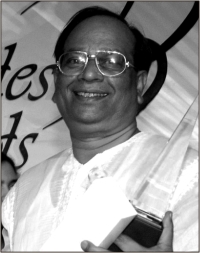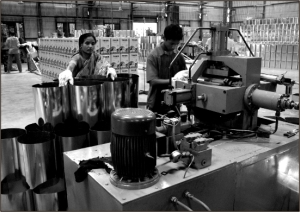Business Person of the Year
Building a brand in food
 Fazlur Rahman
Chairman of City Group of Industries |
In the late 1950s, a nine-year old boy in Gandaria had to leave school unexpectedly and take over the helm of the family livelihood when his father was stricken with paralysis. Despite years of struggle when the boy ran a grocery store at a very tender age, he always harbored a secret dream he aspired to be a business magnate when he grew up! He was still too young to verbalize what it was he wanted to do but of the ultimate goal, he was sure of. That, in a nutshell, is the background of none other than Fazlur Rahman, a well acknowledged player in the private sector today and the proud owner of a business conglomerate worth Tk 4.5 bln.
The enterprise that Rahman has created, City Group, today produces numerous items in the food sector ranging from various types of oil (soybean, palm, mustard, and coconut), to flour, iodized salt, and mineral water. These products are all branded as 'Teer', his flagship brand that has become a successful household name. Some of the companies in his group are also engaged in producing feedmeal, woven bags, steel rods, tin containers, and plastic drums. Total revenue for the group amounted to Tk 22 bln last year with a profit of Tk 340 mln; approximately 5,000 people are currently employed by Rahman. His personal contribution to the national exchequer amounts to Tk. 19 mln.
City Group's journey over the years has not been an easy ride, even though Rahman is characteristically modest about his perseverance in initial years. “There was no hardship, only ups and downs”, he comments. Rahman remembers using his entire life savings to launch his first venture of mustard oil production at the age of 19. This company, City Oil Mills, eventually saw some profits which were all wiped out in the early 1970s when oil prices dropped. Undaunted, Rahman borrowed from a friend and again restarted his mills including a new steel mill in 1980. Unfortunately, the flood of 1988 again destroyed his inventories and pulled him down. Help came in the form of luck, understanding financiers and an ever-supportive invalid father, Rahman never had to look back again. In that very year, he was able to profit Tk 35 mln even after paying his banks off. Over the next decade, he was able to take his enterprise to new heights by launching a soybean refinery, re-rolling mill, flour mill and buying a tank terminal.
Retrospectively, Rahman knows that each of his decisions to enter new product areas took an average of 10 years but he is satisfied with the scale and scope he has been able to build up today. He knew that with increasing population, changing lifestyle and growing quality consciousness, the food sector would be lucrative. And he also rightly predicted that quality production would be critical. That is precisely why he has invested in state-of-the-art European machinery to give 'Teer' products an edge over others. He also ensures better raw materials vis-à-vis other competitors in the hope that 'Teer' will come to represent quality, quantity and commitment to his millions of consumers.
 Rahman is disturbed by the recent scandals in the Bangladeshi food business. He feels the damage that has been done by the dubious exports of one company will take years to overcome. “This incident has brought tremendous disgrace for our entire country and has significantly affected our prospects for food export”, he points out. He is also frustrated by the widespread practice of adulterating food products in the domestic market. As far as his own business philosophy is concerned, Rahman feels that if a company does not have good relations with customers, quality production and efficient service, it will not be able to survive in the long run - these should be considered as the basic mantra for success. At the same time, Rahman is outspoken against the operations of the mobile food courts. He feels that these surveillance teams often do not have real experience, equipment and expertise to carry out proper analysis; hence they should not be allowed to destroy people's decades of effort by issuing random reports.
Rahman is disturbed by the recent scandals in the Bangladeshi food business. He feels the damage that has been done by the dubious exports of one company will take years to overcome. “This incident has brought tremendous disgrace for our entire country and has significantly affected our prospects for food export”, he points out. He is also frustrated by the widespread practice of adulterating food products in the domestic market. As far as his own business philosophy is concerned, Rahman feels that if a company does not have good relations with customers, quality production and efficient service, it will not be able to survive in the long run - these should be considered as the basic mantra for success. At the same time, Rahman is outspoken against the operations of the mobile food courts. He feels that these surveillance teams often do not have real experience, equipment and expertise to carry out proper analysis; hence they should not be allowed to destroy people's decades of effort by issuing random reports.
Overall, Rahman believes that professionalism and responsible business practices will flourish in corporate Bangladesh once entrepreneurs mature beyond the current first generation. He also feels that the government can play a more effective role in helping our private sector become more competitive. Rahman cites specific areas that can benefit from intervention for instance, businesses need coherent policy support and interest rate consistency to compete with our neighboring countries. Furthermore, the entire range of benefits available as part of SAARC and other trade agreements have remained largely unexplored. Industry is the key to growth for our country; if the government realizes this and works towards removing the obstacles, the private sector of this country can achieve much more.
Rahman's vision for the future is to provide hygienic and quality food consumables to consumers at an affordable price. He also has an ambitious plan of producing a complete food chain including milk powder, spices, and additives that can occupy the entire shelf of a standard food store. Rahman fondly looks forward to the day when he will be able to hand over the mantle of his leadership to his children. Up until then, he is definitely going to remain a force to reckon with.